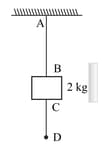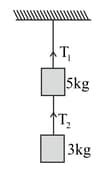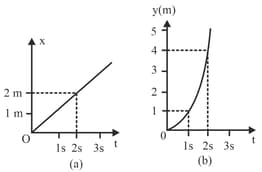NCERT Solutions for Chapter: Laws of Motion, Exercise 4: SA
NCERT Physics Solutions for Exercise - NCERT Solutions for Chapter: Laws of Motion, Exercise 4: SA
Attempt the practice questions on Chapter 5: Laws of Motion, Exercise 4: SA with hints and solutions to strengthen your understanding. NCERT Exemplar Physics - Class 11 solutions are prepared by Experienced Embibe Experts.
Questions from NCERT Solutions for Chapter: Laws of Motion, Exercise 4: SA with Hints & Solutions
A mass of is suspended with thread (figure). Thread of the same type is attached to the other end of mass. Lower thread is pulled gradually, harder and harder in the downward direction so as to apply force on . Which of the threads will break and why?

In the above-given problem if the lower thread is pulled with a jerk, what happens?

Two masses of and are suspended with help of massless inextensible strings as shown in Figure. Calculate and when whole system is going upwards with acceleration
Block of weight rests on a frictionless inclined plane of slope angle (Figure). A flexible cord attached to passes over a frictionless pulley and is connected to block of weight . Find the weight for which the system is in equilibrium.
A block of mass is held against a rough vertical wall by pressing it with a finger. If the coefficient of friction between the block and the wall is and the acceleration due to gravity is , calculate the minimum force required to be applied by the finger to hold the block against the wall?
A gun fires a ball of 1kg horizontally from a cliff of height . It falls on the ground at a distance of from the bottom of the cliff. Find the recoil velocity of the gun. (acceleration due to gravity)
Figure and shows diagram of a particle moving in dimensions If the particle has a mass of , find the force (direction and magnitude) acting on the particle.

A person in an elevator accelerating upwards with an acceleration of , tosses a coin vertically upwards with a speed of . After how much time will the coin fall back into his hand?

